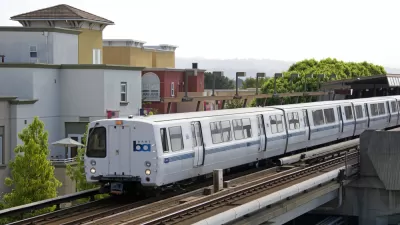A new report by the Bay Area Council argues that the regionwide housing crisis demands a regionwide response, i.e., all nine counties and 101 cities need to build more housing, and if they don't, there needs to be consequences.
As the title of the Bay Area Council report indicates, the “Roadmap for Economic Resilience” is about keeping the Bay Area a "global economic powerhouse." It's biggest threat is from within—by not addressing challenges as a region.
"The need is perhaps most visible in the housing crisis that has become one of San Francisco’s most contentious issues," writes David R. Baker, energy and clean tech reporter for the San Francisco Chronicle.
For years, the region has not been building enough housing, said Jim Wunderman, President and CEO of the Bay Area Council. Some cities have actively encouraged new housing while others have tried to shut it out. Unaffordable prices are the result.
“The core issue is under-supply,” Wunderman said.
"But the report’s prescriptions for solving the crisis would be difficult to carry out, in part because they would require cities to give up some of their power," writes Baker
For example, regional planners already set goals for the number of housing units each Bay Area city should build, goals that many cities routinely ignore. The report recommends punishing cities that don’t meet the targets, perhaps by stripping them of the ability to approve or reject development projects.
BAC is not the first to recommend a stern approach to cities refusing to do their "fair share." "Renters' advocates in San Francisco are building a political and fundraising base to legally challenge suburbs that aren't pulling their weight in constructing the housing to meet the demands of population growth," wrote Planetizen managing editor James Brasuell in September.
An alternative approach would "expand 'by right' approval for housing," writes Baker. "If a proposed housing project complied with local zoning and building codes, no city would be able to block it." See by-right housing, "in which certain multifamily housing are designated a permitted use" (California Government Code Section 65589.4).
The report also looks at other regional issues such as transportation, recommending "establishing a regional gasoline tax, sales tax or vehicle license fee (VLF)," adds Baker.
Hat tip: MTC-ABAG Library
FULL STORY: Bay Area group’s housing solution: Punish cities that don’t build

Alabama: Trump Terminates Settlements for Black Communities Harmed By Raw Sewage
Trump deemed the landmark civil rights agreement “illegal DEI and environmental justice policy.”

Study: Maui’s Plan to Convert Vacation Rentals to Long-Term Housing Could Cause Nearly $1 Billion Economic Loss
The plan would reduce visitor accommodation by 25% resulting in 1,900 jobs lost.

Planetizen Federal Action Tracker
A weekly monitor of how Trump’s orders and actions are impacting planners and planning in America.

Wind Energy on the Rise Despite Federal Policy Reversal
The Trump administration is revoking federal support for renewable energy, but demand for new projects continues unabated.

Passengers Flock to Caltrain After Electrification
The new electric trains are running faster and more reliably, leading to strong ridership growth on the Bay Area rail system.

Texas Churches Rally Behind ‘Yes in God’s Back Yard’ Legislation
Religious leaders want the state to reduce zoning regulations to streamline leasing church-owned land to housing developers.
Urban Design for Planners 1: Software Tools
This six-course series explores essential urban design concepts using open source software and equips planners with the tools they need to participate fully in the urban design process.
Planning for Universal Design
Learn the tools for implementing Universal Design in planning regulations.
Caltrans
Smith Gee Studio
Institute for Housing and Urban Development Studies (IHS)
City of Grandview
Harvard GSD Executive Education
Toledo-Lucas County Plan Commissions
Salt Lake City
NYU Wagner Graduate School of Public Service





























